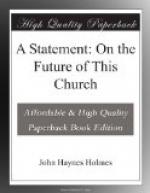This vision of the church as a community, or civic centre, is the logical application of socialized religion. It is no accident that together these two things have captured my life. For a moment, just as the idea of the social question set me thinking of leaving the church altogether, so this idea of the community church set me thinking of leaving this church and organizing in this city an independent religious movement. Indeed, this latter thought has been something more than a [13] momentary temptation. To have a church has been with me from the beginning a necessity. To have a church of the new community order has become a great desire. Last spring I seriously considered presenting to you my resignation, that I might enter upon the fulfillment of this hope. Last summer I pretty definitely made up my mind to lay this problem and prospect before you, as soon as peace should come, and the distractions of war be gone. Then, at the very moment when peace came, as though to anticipate and thus forestall my decision, there came the call from Chicago.
Most of you know what Abraham Lincoln Centre is, and many of you by what pioneer devotion this church of the future was fashioned out of a traditional church of the past. It is not perfect; in some ways it is already itself became traditional again. But it stands today as a more complete embodiment of what I feel a modern church should be than any other institution of which I know in America. The invitation from the people seemed to me an instant bestowal of all for which I seek. I do not think I could have resisted this call to service, had it not been for your rightful claims of loyalty and affection, and my own reluctance to abandon the project of accomplishing my desires in New York. These considerations made me hesitate—and while I hesitated, I thought. Why should I turn elsewhere for the fulfillment of hopes which may be as surely if not as swiftly realized here? Why should I undertake to build an independent church in this city, or accept the leadership of a church however remarkably developed in Chicago, when the Church of the Messiah, pledged to freedom, and long committed to the idea of progress, lies ready to my hand? Why should I seek the easy inheritance of another man’s completed work, and thus avoid the hard labor of building an institution of my own, which, for that reason alone, would be moulded nearer to my heart’s desire? Above all, why should I assume that my people who have loved and sustained me these dozen years, are unwilling to move on with me in comradeship [14] to the new pathways of the new world which we have entered, or by what right make decision involving my future ministry here or elsewhere, without taking them fully into my confidence and searching the utmost temper of their minds? These were the questions which came to me promptly on the receipt of the Chicago call. Should I undertake to organize an independent church in New York, should I go to Chicago as minister of All Souls’ Church and Director of Abraham Lincoln Centre, should I stay here as minister of this Church of the Messiah—this was my problem. I could not solve it, with fairness to myself or to you, until you had spoken. Hence, the meeting of last Monday night, called by the helpful co-operation of the Board of Trustees, and attended largely by our people.




